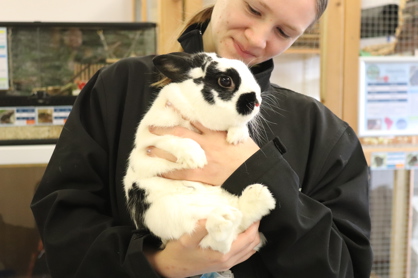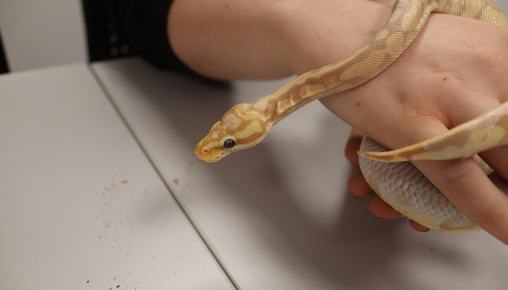
Work-Based Animal Care - Level 3
Start Date: 1st September 2026

- Length 1 Year
- Study Full-Time
- Location Kidderminster College
More about the course
This practical, work-based course reflects the skills and knowledge needed to become an Animal Care professional.
The practical part of this course will be carried out at WILD Zoological Park where you will get the chance to work alongside an array of exotic animals such as ring-tailed lemurs, meerkats, wallabies, emus, lorikeets, kookaburras, marmosets, skunk, a large collection of reptiles such as snakes and lizards, as well as a 45-strong collection of birds - including eagles - which take part in daily free-flying bird shows.
Entry requirements:
You will hold 4 GCSE’s at grade 4 or above.
A grade 4 or above in GCSE English and Maths is desirable.
You will successfully complete an interview.
Please note that entry requirements and course offer can be subject to change at any time.
What will I achieve?
Upon successful completion of this course, you will receive a Level 3 Work-Based Animal Care Diploma.
What will I learn?
- Implement, monitor and evaluate plans for the health and welfare of animals
- Plan the diets and feeding regimes for animals
- Animal training programme
- Recognise and interpret the behaviour of animals
- Handling, restraint, and movement of animals
- Some of the tasks you'll carry out at WILD Zoological Park include:
- Cleaning, feeding and providing water to the collection of animals at the zoo
- Interacting with members of the public during animal encounter shows
- Accommodation maintenance
How is the course taught?
You will be taught on the main campus for theory, with animals being brought to the classrooms to gain further experience.
You will also attend weekly practical sessions at WILD Zoological Park.
How am I assessed?
- Portfolio
- Assignments
- Group work
- Practical work
Work experience opportunities:
As part of your course, you will be required to complete a period of work experience. This forms an essential component of your overall study hours and is designed to support your learning and progression. The number of hours you need to complete will vary depending on the level and type of qualification you are undertaking. There is an expectation that your placement will be relevant to your chosen course, helping you gain valuable insight and practical skills in your subject area. While learners are expected to secure their own placement, our dedicated Work Experience Coordinator will support you throughout the process and ensure that all placements meet the necessary compliance and safeguarding requirements.
English and Maths:
Maths will be included in weighing out food, completing jobs in industry timing, and also learning the timings of animal handling shows.
English will be included in learning new terminology and putting it into practise, as well as developing communication and listening skills by working as a team and following instructions.
Tutorial
Tutorial is a program of essential topics affecting you as a potential employee and member of a community. You will cover topics to improve employability skills, mental fitness (both for you and those around you) and much more. It is an essential part of your personal development.
As part of you weekly timetable, you will be expected to take part in Tutorial. This consists of a 1-1 meeting (at least 3 a year) and Personal Development activities that develop you both personally and professionally. Part of the focus is to raise digital Standards and take part in Employer Engagement Activities such as guest speakers, logging Work Experience and in person and online networking.
We work with Student Experience, Careers and your Curriculum team to ensure your Tutorial elements link to your industry area and to create opportunities to develop key skills for profile raising as well as enabling you to create competitive applications and CVs.
Tutorial is also an opportunity to check in with you as part of a group and individually. You can discuss any issues you might be having that affect your learning and essentially identify strategies and support available to you.
Where can I progress?
Upon successful completion of this course, you could progress onto our Level 4 Certificate in Higher Education in Animal Management
Alternatively, you can go straight into employment.
Get in Touch
Meet our tutors and students

Tom Grosvenor
Tutor - Work-Based Animal CareFrom my experience in the industry working with Cheetahs, Lorikeets, Tigers, Reindeer and Llamas to Chinchillas, it is essential students get the opportunity to gain invaluable experience working hands-on with animals and gaining knowledge in the classroom. The courses I run are a great mix of exciting and informative theory sessions and work-related practical experience working with various animals, including Emus, Wallabies, Alpacas, Pigs, Lemurs, Horses, Macaws, Cows and many more!
Animal Care
Gallery

What can I do with a qualification in Work-Based Animal Care?
Careers for this subject will be updated soon.
What's happening?
Events

February Open Evening
Kidderminster College
Tuesday 10th February 2026
5:30pm - 7:30pm

May Open Evening
Kidderminster College
Wednesday 13th May 2026
5:30pm - 7:30pm
Course Added
This course has now been added to your basket. Please click below to apply now or contine browsing.
Apply Now
 How To Apply For a Course
How To Apply For a Course
 Work Experience - Student
Work Experience - Student
 Student Support
Student Support
 Levels Explained
Levels Explained


